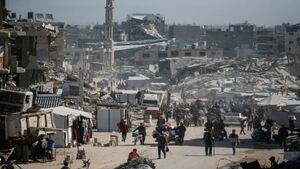The report, titled Tracking Tourism Trends in Africa, highlights how instability in various African regions has created fertile ground for radicalism, with both established and emerging Islamist groups vying for power.
One of the most striking findings of the report is that terrorist activity, traditionally concentrated in North Africa, is increasingly spreading to Central and Southern Africa. According to Benji Shulman, Executive Director of the Institute, while countries like Tunisia, Mali, and Mauritania have historically been seen as the epicentre of terrorism, newer hotspots are now emerging in sub-Saharan Africa. The report specifically points to countries such as Nigeria, Somalia, the Democratic Republic of Congo (DRC), and Mozambique as key locations where radical groups are gaining ground.
"In recent years, we've witnessed a shift in the geography of terrorism. Southern Africa, including the DRC and Mozambique, is now experiencing a rise in terrorist activities, which were once thought to be more of a Northern African problem," Shulman said during a live interview.
In countries like the DRC and Mozambique, ongoing instability, such as in the Cabo Delgado region of Mozambique, has created an environment where both local and international terrorist groups can thrive. Shulman explained that local grievances, including exclusion from government and economic opportunities, often prompt groups to resort to violence. However, these groups are increasingly affiliating with larger international organizations like e Islamic State of Iraq and Syria (ISIS), which offers resources and a platform for greater influence.
While Southern Africa has historically been seen as relatively calm in terms of terrorism, Shulman expressed growing concerns about the region, particularly Mozambique. He noted that the presence of extremist groups in the region is a cause for alarm, with the potential for the violence to spill over into neighbouring countries like SA.
"If the situation in Mozambique is not contained, it could have serious ripple effects on the region. The instability in Cabo Delgado could inspire more localised radical groups to form, potentially destabilising neighbouring areas," Shulman warned.
SA's role in the global fight against terrorism is also under scrutiny. While the country has not experienced widespread violent extremism, it is becoming a key player in financing extremist activities. The report highlights how SA has been used as a financial hub for groups like ISIS, with funds flowing from the country into other parts of Africa to support terrorism. The lack of strong legislation and enforcement has allowed this to happen with little oversight.
"We are not yet seeing significant violent activity linked to terrorism in South Africa, but the financial networks operating here are deeply concerning," Shulman explained. "The absence of robust legislation and the inability to track these financial flows make SA a significant player in the global terrorism ecosystem."
In conclusion, the report underscores the urgent need for stronger counterterrorism measures across Africa. For SA, the priority is to tighten financial regulations and bolster its security infrastructure to prevent funds from supporting extremist groups. Across the continent, governments must address the root causes of extremism, including political instability, social exclusion, and economic inequality, to prevent further radicalisation.
The Middle East Africa Research Institute's findings serve as a stark reminder of the evolving and interconnected nature of terrorism in Africa, with serious implications for the region's security and stability.
--ChannelAfrica--













